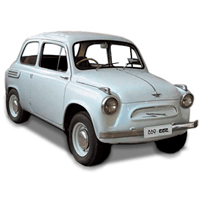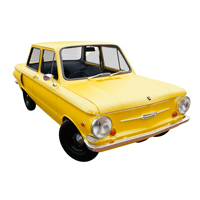
Catalog / ZAZ
ZAZ: Ukraine's Automotive Pride - Pricing and History Unveiled
Zaporizhzhia Automobile Building Plant, widely known as ZAZ, holds a special place in the automotive history of Ukraine and the former Soviet Union. Founded in 1863 as a farm-equipment factory, ZAZ began its journey into automobile production in 1960 with the launch of the iconic ZAZ-965, affectionately nicknamed 'Zaporozhets'.
The ZAZ-965, inspired by the Fiat 600, became a symbol of affordable mobility in the Soviet era. Its unique design, featuring a rear-mounted air-cooled engine, made it stand out and earned it the nickname 'hunchback' due to its distinctive shape. This car marked the beginning of ZAZ's mission to provide accessible transportation to the masses.
In 1970, ZAZ introduced the ZAZ-966, which continued the rear-engine concept but with a more modern design. This model, often called the 'big-eared Zaporozhets' due to its protruding air intakes, became another cult classic.
The 1980s saw the introduction of the ZAZ-968M, an updated version of its predecessor, which remained in production until 1994. During this period, ZAZ also produced the ZAZ-1102 Tavria, the first front-wheel-drive car from the company, marking a significant technological leap.
After Ukraine's independence, ZAZ faced challenges but managed to adapt. In 1998, the company entered into a partnership with Daewoo Motors, leading to the production of rebadged Daewoo models. This collaboration helped modernize ZAZ's production facilities and expand its model range.
In the 21st century, ZAZ continued to evolve. The company started producing models under license from various international brands, including Chevrolet and Chery. The ZAZ Lanos, based on the Daewoo Lanos, became one of the most popular cars in Ukraine.
An interesting fact about ZAZ is that it produced the first Ukrainian electric car, the ZAZ Lanos Electric, in 2010. While it was a limited production model, it showcased the company's ability to innovate and adapt to changing automotive trends.
Today, ZAZ continues to play a significant role in Ukraine's automotive industry. While facing challenges in the competitive global market, the brand remains an important part of Ukrainian industrial heritage, symbolizing the country's engineering capabilities and the democratization of car ownership in Eastern Europe.


